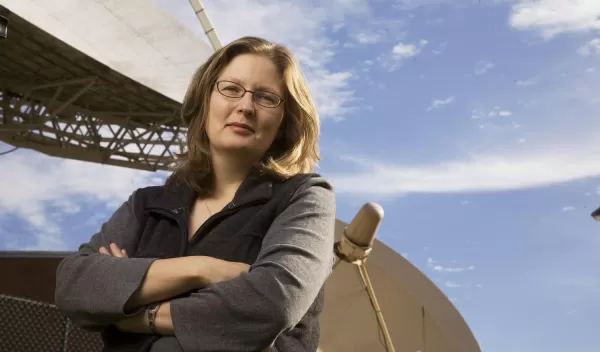
After the lecture: Astronomer Kelsey Johnson
University of Virginia astronomer Kelsey Johnson recently delivered a talk titled "How were the most ancient objects in the universe formed?" as part of the National Science Foundation's (NSF) Distinguished Lectures series. NSF's Mathematical and Physical Sciences directorate supports Johnson's work investigating the conditions that gave rise to star-forming regions. After her lecture, we sat down with Johnson to talk about everything from globular clusters to societal fears of science and why we shouldn't feel so small in a vast and expanding universe.
Globular clusters are the most ancient found objects in the universe but we only have 150 to 200 of them that live in the halo of our galaxy. For every 100 formed, probably fewer than 10 have survived to the current day.
Shakespeare got it wrong. Stars are born, and they die.
I think about trying to raise a scientifically literate generation of children capable of critical thinking. I remember a day when I was walking home from school as a kid. I had learned fire needs air to burn. I also had learned there was no air in space. After I got home, I remember asking my mom, "Then how do stars burn?" This was a major mystery to me -- and my mom! I had these two facts that didn't agree. It was the first hint of my interest in astronomy. I was probably 10 years old.
Scientific literacy is phenomenally important in our society. To paraphrase the late Carl Sagan, we have managed to construct a society almost completely dependent on science and technology but where almost no one understands it. This is a recipe for disaster.
Many take for granted the many, many ways science impacts their lives and the decisions they make -- everything from "Does this aging cream really work?" to whether to vaccinate children. The reality is that most people don't understand science.
Most adults have been conditioned throughout their lives to think science is scary or beyond their reach. It's hard to deprogram adults once they've reached that point psychologically.
With kids, life is just one big experiment. Toddlers playing? They're just doing little experiments to see how things work. Throw food from the high chair, and yes, gravity still works.
"Dark Skies, Bright Kids" tries to get science into the lives of kids and give them momentum, confidence and a love of science to keep them going through middle school.
The goal of the program isn't actually to teach the kids science; it's to get them to like science and to get them to think, "I can be a scientist."
One day a week for 10 weeks, we build relationships with these kids and become mentors.
I use the analogy of a bonfire. If you want to start a bonfire, and the kindling is dry, stacked, and ready to go, all you have to do is light a match, and the fire will burn. With this program, we're trying to build a bonfire in the soggy, wet woods. But if you really want these kids to catch on to science -- which I believe we do -- then you create an environment that shows them a future of possibilities.
To see if we are effective in changing perspective, we have students draw a scientist doing science on the first day of the program and the last. We hope by the end of the program they will ultimately draw scientists more like themselves, not just someone who looks like Einstein in a white coat, blowing up something in his lab. Most of our program volunteers are women. In one particular instance when we got to the end of the program, one boy looks around and says, "Well, I guess I should draw a woman since most scientists are women."
There is something fundamentally addictive and viscerally powerful about seeing something in the universe no one else has ever seen before.
I may come to eat my words, but I would bet within five to 10 years, we see evidence of pre-biotic or biologically related molecules. I'm talking about life. OK, not macrobiotic, two-legged, three-headed life, but microscopic organisms.
On the one hand, we are an infinitesimal, little speck on this planet floating in this cosmic void, but, on the other hand, we are in fact part of it. We're part of something pretty amazing. And grand. And beautiful. And as far as we know, we are the only sentient life capable of contemplating the nature of this universe we're part of. I think that makes us pretty important.
